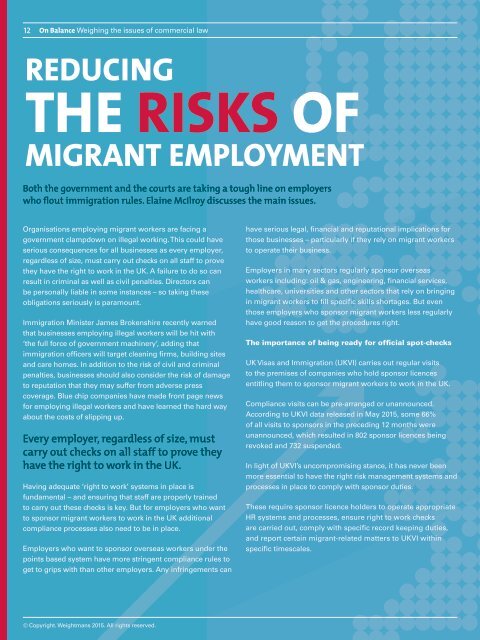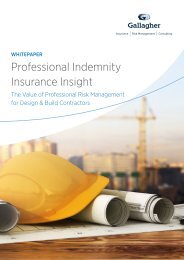On Balance Autumn/Winter 2015
Create successful ePaper yourself
Turn your PDF publications into a flip-book with our unique Google optimized e-Paper software.
12 <strong>On</strong> <strong>Balance</strong> Weighing the issues of commercial law<br />
REDUCING<br />
THE RISKS OF<br />
MIGRANT EMPLOYMENT<br />
Both the government and the courts are taking a tough line on employers<br />
who flout immigration rules. Elaine McIlroy discusses the main issues.<br />
Organisations employing migrant workers are facing a<br />
government clampdown on illegal working. This could have<br />
serious consequences for all businesses as every employer,<br />
regardless of size, must carry out checks on all staff to prove<br />
they have the right to work in the UK. A failure to do so can<br />
result in criminal as well as civil penalties. Directors can<br />
be personally liable in some instances – so taking these<br />
obligations seriously is paramount.<br />
Immigration Minister James Brokenshire recently warned<br />
that businesses employing illegal workers will be hit with<br />
‘the full force of government machinery’, adding that<br />
immigration officers will target cleaning firms, building sites<br />
and care homes. In addition to the risk of civil and criminal<br />
penalties, businesses should also consider the risk of damage<br />
to reputation that they may suffer from adverse press<br />
coverage. Blue chip companies have made front page news<br />
for employing illegal workers and have learned the hard way<br />
about the costs of slipping up.<br />
Every employer, regardless of size, must<br />
carry out checks on all staff to prove they<br />
have the right to work in the UK.<br />
Having adequate ‘right to work’ systems in place is<br />
fundamental – and ensuring that staff are properly trained<br />
to carry out these checks is key. But for employers who want<br />
to sponsor migrant workers to work in the UK additional<br />
compliance processes also need to be in place.<br />
Employers who want to sponsor overseas workers under the<br />
points based system have more stringent compliance rules to<br />
get to grips with than other employers. Any infringements can<br />
have serious legal, financial and reputational implications for<br />
those businesses – particularly if they rely on migrant workers<br />
to operate their business.<br />
Employers in many sectors regularly sponsor overseas<br />
workers including: oil & gas, engineering, financial services,<br />
healthcare, universities and other sectors that rely on bringing<br />
in migrant workers to fill specific skills shortages. But even<br />
those employers who sponsor migrant workers less regularly<br />
have good reason to get the procedures right.<br />
The importance of being ready for official spot-checks<br />
UK Visas and Immigration (UKVI) carries out regular visits<br />
to the premises of companies who hold sponsor licences<br />
entitling them to sponsor migrant workers to work in the UK.<br />
Compliance visits can be pre-arranged or unannounced.<br />
According to UKVI data released in May <strong>2015</strong>, some 66%<br />
of all visits to sponsors in the preceding 12 months were<br />
unannounced, which resulted in 802 sponsor licences being<br />
revoked and 732 suspended.<br />
In light of UKVI’s uncompromising stance, it has never been<br />
more essential to have the right risk management systems and<br />
processes in place to comply with sponsor duties.<br />
These require sponsor licence holders to operate appropriate<br />
HR systems and processes, ensure right to work checks<br />
are carried out, comply with specific record keeping duties,<br />
and report certain migrant-related matters to UKVI within<br />
specific timescales.<br />
© Copyright. Weightmans <strong>2015</strong>. All rights reserved.




